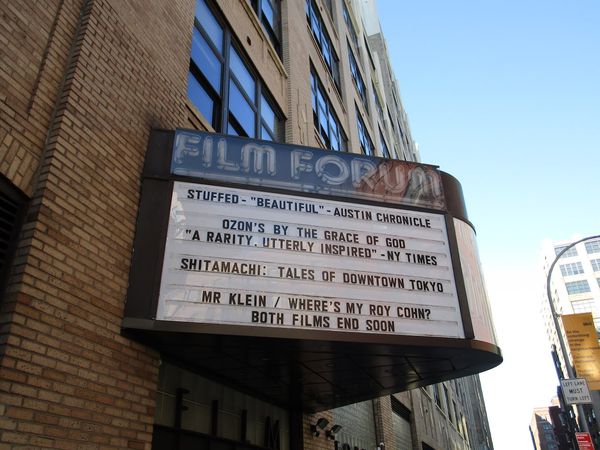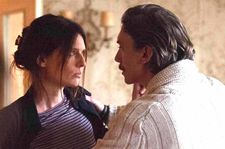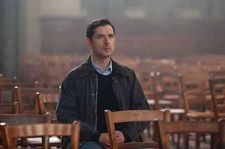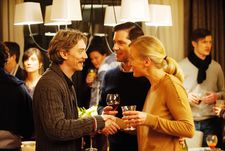 |
| François Ozon on By The Grace Of God (Grâce À Dieu): “It was important to show the complexity of all these characters.” Photo: Anne-Katrin Titze |
François Ozon’s timely and relevant By The Grace Of God (Grâce À Dieu), shot by Manuel Dacosse (Jean-François Richet’s The Emperor Of Paris) edited by Laure Gardette (Double Lover, Frantz, The New Girlfriend, Young & Beautiful, In The House, Potiche, Nadine Labaki’s Capernaum), and costumes by Pascaline Chavanne (Christian Petzold’s Barbara, Etienne Comar’s Django), stars Melvil Poupaud, Denis Ménochet and Swann Arlaud with Aurélia Petit, Josiane Balasko, Éric Caravaca, Martine Erhel, François Marthouret, Bernard Verley, Amélie Daure, Hélène Vincent, Max Libert, Nicolas Bauwens, Zuri François, Timi-Joy Marbot, and Zéli Marbot.
 |
| Alexandre Guérin (Melvil Poupaud) and François Debord (Denis Ménochet) with Gilles Perret (Éric Caravaca) |
In the second half of my in-depth conversation with the director/screenwriter we discuss the complexity of the characters who are struggling to come to grips with memories from the past and the importance of the flashbacks in telling the story.
Anne-Katrin Titze: At one point in the film the priest addresses one of his now adult victims with the familiar "tu" instead of the formal "vous" which would be used for adults. This is all from the transcripts?
François Ozon: Yes.
AKT: He is treating him as if he were still a boy.
FO: It's difficult to translate that, I think they said "Son."
AKT: That works.
FO: In French it's very important because they told me, "We had the feeling when we were in front of Preynat, the priest, he considered us still like a child." For them it's terrible because they felt again the feeling they had as a child. It's very disturbing.
 |
| Emmanuel (Swann Arlaud) with his girlfriend Jennifer (Amélie Daure) |
AKT: It's why you chose the flashbacks?
FO: The flashbacks were very important. We had lots of discussions with the chief editor [Laure Gardette]. Do we have to use it or not? And I was not sure. But my chief editor thought it was very important because when you are abused, people don't understand why you didn't escape, why you stayed.
And actually when you speak with an abused child, they are paralysed, they don't understand what's happening. They are frozen in place and I wanted to show it. Of course it was impossible to show the act of abuse. But it was interesting for me to show how and where it happened and how the child is like a lamb in front of the wolf, you know. He goes to the wolf without knowing - and trusting the adult.
AKT: You understand that in the film. You show these men in positions we don't see in cinema very often. Melvil Poupaud as Alexandre, you show him with his Barbour jacket, five children, successful Lyon citizen and everything is perfect.
FO: It looks perfect.
 |
| François Ozon on Alexandre (Melvil Poupaud) in his Barbour jacket: “It looks perfect.” |
AKT: It looks perfect and underneath lies all this trauma. That juxtaposition was also important to show?
FO: Yes it was important to show the complexity of all these characters. It's not black and white, it's not bad and good people, it's what I discovered during the investigation.
AKT: The scenes where the sons go to see the Cardinal ...
FO: They wanted to help their father. It's something I didn't invent. It's the truth. Sometimes you realise reality is stronger than fiction. I wouldn't have been able to invent that as a scriptwriter. My producer would have told me "It's too much." The wife, you know, who was abused, she told me that during an interview.
I was asking her "How did you support your husband during all this time? Was it difficult?" And she said "It was difficult, but I had to support him. I'm going to tell you a secret." And she closed the door. Because the children were in the room next door. And she told me "I was abused myself."
AKT: And what did you do with the secret?
FO: I asked her, "Can I use it for the film? Because it's very interesting for me to show that your couple is built on this secret. And why you are so much with your husband and supporting him." And she said "Okay, just change one thing."
 |
| François Debord (Denis Ménochet) with his mother Odile (Hélène Vincent) |
AKT: The couple is very strong. I loved how she was there with her full support, no predictable Hollywood twist, it didn't feel constructed. When the sons visit the Cardinal and Régine hands them the book called Is God Outdated? You want to laugh and cry. And another moment of suspense is when François's mother hands over the letters and makes a point of saying there are no copies. Spectators may feel that something horrible could happen.
FO: Ah, you had that feeling?
AKT: Yes.
FO: You know, what was very shocking was the fact that everybody knew for such a long time. And they did nothing. When you discover the story, it's amazing. Because people knew. Everything. And they did nothing, they just changed the place of the priest and thought it was enough.
AKT: Someone in the film says, coming forward means that you will be known for the rest of your life as the victim of a paedophile.
FO: That's the problem of many men or women who don't want to talk. Especially when they are young, it's very difficult. If you come out, you have to live with that. That's why very often people wait to be settled in their life. You know that's why Alexandre is able to speak. When he's 40 years old, when he has a family, when he has children. He has a wife, he has a good job, at this moment, he's clear in his life and he's able to come out.
 |
| Emmanuel (Swann Arlaud) and Alexandre (Melvil Poupaud) with his wife Marie (Aurélia Petit) |
And for Emmanuel it's more complex because he has no life. Or Didier, the one he meets, it's impossible for him to speak, because it will be too heavy. He has to build himself first, and after that you are able to talk. And with women it's very often the same thing.
AKT: Right.
FO: Women who have been raped, they need time. It's something people don't very often understand. They say "Why didn't you say that before?" Because you have to have the right distance to understand what happened to you. You have to lose this feeling of guilt you very often have when you are raped or abused.
AKT: Which counters the statute of limitations, the whole idea of that.
FO: In France it changed at the moment of the story in the film. It was 20 years after your majority, so you had until 38. And Alexandre decided to come out when he was 40, so it was too late. And now it's 30 years. Until 48 to come out, so it's a good thing. In America, there's no statute of limitations? It depends on the state?
AKT: It depends on the state. This is a topic that relates directly to the title.
 |
| By The Grace Of God posters at Film Forum in New York Photo: Anne-Katrin Titze |
FO: It was obvious to use it. Thank you to Cardinal Barbarin, he had the right words for the title for me. It was amazing to hear that [Barbarin commented that "by the grace of God" the cases against Preynat were covered by the statute of limitations]. It was so shocking, that's why we decided during the shooting not to tell the press about the title of the film. Everybody would have known it's a film about the Barbarin affair.
AKT: What was your faux title?
FO: Alexandre. It was a fake title and it was perfect. It was good cover.
AKT: What's so amazing is all that was spoken about. That the priest admits what he did, nothing hidden.
FO: That's why it's so unfair and shocking. And you realise the priest said from the first day he was a priest "I have a problem with kids."
AKT: Hidden in plain sight.
FO: Yes. I think the problem with the Catholic church was for a very long time to make a confusion between homosexuality and paedophilia.
Read what François Ozon had to say on the structure of By The Grace Of God and the journey he took to get the film released.
By the Grace of God is in cinemas in the US and opens in the UK on October 25





















